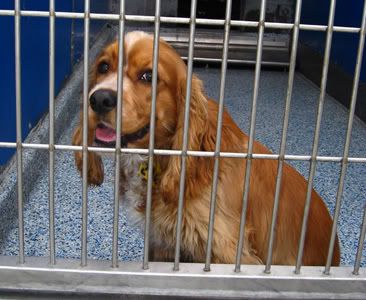Frequent lbpost.com contributor Yvonne shares her story about a recent visit to Long Beach Animal Care Services, and how it highlights an urgent problem in the community.
It’s a rare occasion when I go to the Animal Care Shelter. My heart just aches when I look upon these most loving of God’s creatures with their big eyes searching for my teary ovals and calling out, “Take me home.” Knowing the possibility and inevitability that some of these innocents will be put to death, I leave with a heavy heart and I cry.
Please don’t misunderstand my feelings about this facility. It is a fine center for harboring abandoned companion animals. Since John Keisler has taken over as acting and then official Director of the Shelter, many positive changes have transpired. John’s forward thinking and proactive approach have been an energizing breath of fresh air for the employees and the community activists who hope that a day will come when no adoptable animal will needlessly die. His innovative programs have brought new life to a worth cause. The buildings and grounds of the Center are beautiful and immaculately groomed. Adoptions are encouraged and assisted with kindness and careful consideration. The new website is impressive and full of useful information.
The real blame for my grief lies with the citizens of Long Beach and other cities served by the Shelter. It is the irresponsibility of pet owners that perplex and frustrate me. As an illustration, the following transpired during the short time I was visiting the Center this last Saturday.
As I meandered into the shelter, a darling little light-brown cocker spaniel was being led to the relinquishment area. She was about six months of age and had the sweetest disposition. This puppy seemed happy to see anyone, her tail wagging vigorously at any sign of attention. As I kneeled down to her level, she enthusiastically licked my hands and face as if to say, “I really like you.” I immediately piped up, “If you don’t want her, I’ll take her home.”
The two genuinely sincere people that brought her in explained the situation. “We found her in our alley running loose, so we took her in. But, we can’t keep her. We spent two days just driving around looking for signs and asking people if they knew her. Finally, some kids said that she was theirs and that they had gotten her for Christmas after their poodle had been killed by a car. Their parents didn’t want her anymore so they just let her loose so someone else would take her in.”
The couple lamented, “We hated to give her up, but we hope she will find a good home. We’ll keep checking on her until she gets adopted.”
Bless these good Samaritans; and damn the irresponsible family that turned this innocent puppy out onto the streets.
When I left the Shelter, I sat for a moment in my car thinking about this beautiful puppy, unable to leave. My vision was blurred–must have been from the tears I cried.

Unfortunately, this type of abandonment is far too common of an occurrence. Companion animals are discarded as easily as trash and are often treated as such. Worse yet, some become the targets of cruelty by their owners. Others suffer injury and death on the streets from moving vehicles or starvation. The blame lies within the mindset of our citizenry. It is this paradigm that must be changed.
The good citizens of Long Beach can easily do something about this state of affairs. First, they can truly become responsible guardians of their pets. Secondly, they can neuter, microchip and license them. Caretakers need to open their homes to these animals (both dogs and cats) and keep them indoors or on a leash. And lastly, if they spend only a few hours of time making school presentations or sitting at an event table disseminating information or volunteering at the Care Center, people can ultimately save lives.
The City can only do so much to save these loving creatures, but ultimately the responsibility lies with everyday people just like you and I.
To quote the great Indian philosopher, Mahatma Gandhi: “The greatness of a nation and its moral progress can be judged by the way its animals are treated.”
